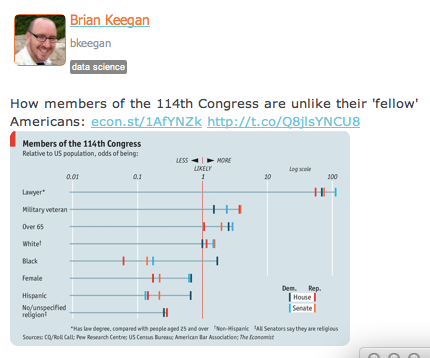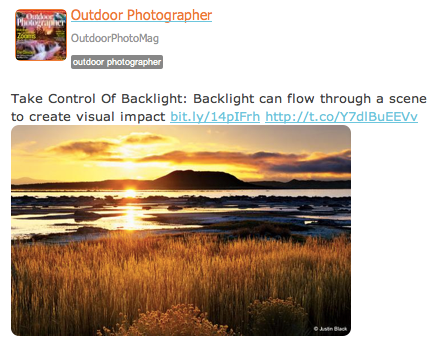Me Meme: An adaptive news digest based on your interests
[This article was first published on Cartesian Faith » R, and kindly contributed to R-bloggers]. (You can report issue about the content on this page here)
Want to share your content on R-bloggers? click here if you have a blog, or here if you don't.
About a month ago, I quietly released a daily news digest service, called Me Meme. This is an email companion to the still-private website that allows you to analyze and run social media models at the click of a button. I previously wrote about some of my models, and how they can infer someone’s interests simply by analyzing who they follow. To recap, the basic idea is that you follow people on social media because you care about what they have to say. This simple observation implies that who you follow is a robust proxy for your interests. Factoring in the effects of homophily means that your interests will roughly correspond to different circles of friends, and the more diverse your interests, the more distinct circles of friends you’ll have. The Me Meme daily digest exploits this property to curate social media news and stories according to your interests. You can read a more complete description on Arxiv. In other words, the number of stories you get on a certain topic/interest will be proportional to the number of people in that circle.
Let’s use my own Twitter account to demonstrate how this works. The following screen grab is from the Me Meme webapp mentioned earlier and is a summary of my computed interests. The proprietary models run in R and blend natural language processing with graph theory to infer each user’s interests.
Want to share your content on R-bloggers? click here if you have a blog, or here if you don't.
 The donut shows the relative size of each interest group. Hence, about a quarter of the people I follow are related to data science, while another quarter are related to social media. I seem to be pretty diverse as I have a number of other interest groups.
In terms of news, the operating assumption is that if you have more people in one circle versus another, then you’re probably more interested in that interest versus another. There are some limitations to this assumption, but on the whole it’s reasonable. The curated stories are proportional to the size of the section of the donuts. For the most part, my daily digest will include 3 times as many articles on data science as on autism. The story will also be tagged with the interest label, so you know the context of the story.
The donut shows the relative size of each interest group. Hence, about a quarter of the people I follow are related to data science, while another quarter are related to social media. I seem to be pretty diverse as I have a number of other interest groups.
In terms of news, the operating assumption is that if you have more people in one circle versus another, then you’re probably more interested in that interest versus another. There are some limitations to this assumption, but on the whole it’s reasonable. The curated stories are proportional to the size of the section of the donuts. For the most part, my daily digest will include 3 times as many articles on data science as on autism. The story will also be tagged with the interest label, so you know the context of the story.
 The result of this approach to curation is that you see stories that other services might filter out. Hence, with Me Meme I’m always guaranteed an article on photography and the Raspberry Pi, whereas in other daily digests I never see a story either of these subjects. This is because these tweets aren’t “popular” enough to bubble up to the top of the ranking algorithm. But by organizing first by interest, it’s a lot easier to find interesting content.
The result of this approach to curation is that you see stories that other services might filter out. Hence, with Me Meme I’m always guaranteed an article on photography and the Raspberry Pi, whereas in other daily digests I never see a story either of these subjects. This is because these tweets aren’t “popular” enough to bubble up to the top of the ranking algorithm. But by organizing first by interest, it’s a lot easier to find interesting content.
 With Me Meme, you can curate the news by curating your friends. Since there’s an observable relationship between the people you follow and the daily digest, changing the content of your daily digest is as simple as following or unfollowing people. Your interests are computed daily, so any changes to your friends will be reflected in the digest. This means that you are in control of your news digest and can tailor it by doing what you already do on social media.
If you liked what you read, sign up for the Me Meme Daily Digest beta. There are many exciting features in the works, and beta users will have first access to the features.
With Me Meme, you can curate the news by curating your friends. Since there’s an observable relationship between the people you follow and the daily digest, changing the content of your daily digest is as simple as following or unfollowing people. Your interests are computed daily, so any changes to your friends will be reflected in the digest. This means that you are in control of your news digest and can tailor it by doing what you already do on social media.
If you liked what you read, sign up for the Me Meme Daily Digest beta. There are many exciting features in the works, and beta users will have first access to the features.
To leave a comment for the author, please follow the link and comment on their blog: Cartesian Faith » R.
R-bloggers.com offers daily e-mail updates about R news and tutorials about learning R and many other topics. Click here if you're looking to post or find an R/data-science job.
Want to share your content on R-bloggers? click here if you have a blog, or here if you don't.
